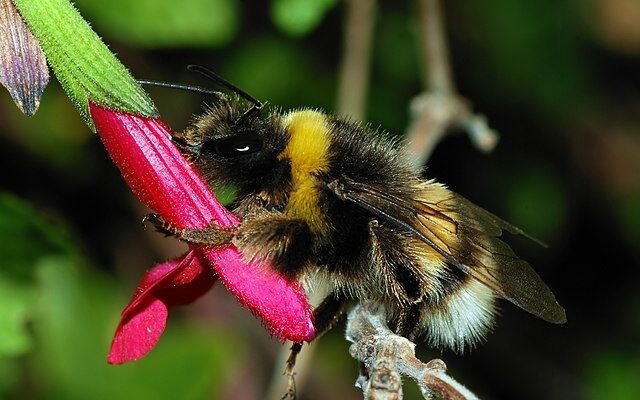
It’s spring and the flowers are blooming. That means that we’re going to see honeybees floating around doing their thing: pollinating 80 percent of the world.
What we didn’t know, until recently, however, was that a great battle between hornets and bumblebees has been ongoing in nature right under our noses. Researchers recently announced they are just learning how the bees survive the vicious attacks. Their defense moves are pretty amazing.
Asian hornets have become an ongoing problem for the bee population. Sightings of the Asian hornets have sparked fears that the vicious insect could establish itself in the United States and devastate bee populations.
Buff-tailed bumblebees drop from air ‘like bricks’ to repel hornet attacks Bee and hornet hit ground with such force the attacker is sent scarpering, University of Exeter scientists told The Guardian.
Bumblebees are not fast or agile enough flyers to evade an attack from an Asian hornet and an airborne scrap would almost certainly result in victory for the latter.
But University of Exeter scientists have found that when attacked, buff-tailed bumblebees have a dramatic but effective response: simply dropping out of the air “like a brick”, taking the hornet with them.
The bee and hornet hit the ground with such force that the hornet either loses its grip or the bee has the chance to raise its sting and send the attacker scarpering.
Thomas O’Shea-Wheller, of the Environment and Sustainability Institute on Exeter’s Penryn campus in Cornwall, said he and his colleagues were impressed and a little amused when they observed the bumblebees’ technique while doing fieldwork in Galicia, north-west Spain.
Although the bees have great fighting prowess, the researchers noted that bumblebee colonies had reduced growth rates in areas with high numbers of Asian hornets.
According to the BBC, “Record sightings of Asian hornets are raising fears of catastrophic consequences for the UK’s bee populations for years to come.
The invasive hornets are wreaking havoc in mainland Europe and threaten to get a foothold in the UK, with nests found in East Sussex, Kent, Devon and Dorset.
Mr. O’Shea-Wheller said it was unclear why colonies in areas with higher Asian hornet densities grew more slowly.”
The New York Times explained that “with queens that can grow to two inches long, Asian giant hornets can use mandibles shaped like spiked shark fins to wipe out a honeybee hive in a matter of hours, decapitating the bees and flying away with the thoraxes to feed their young. For larger targets, the hornet’s potent venom and stinger — long enough to puncture a beekeeping suit — make for an excruciating combination that victims have likened to hot metal driving into their skin.
In Japan, the hornets kill up to 50 people a year. Now, for the first time, they have arrived in the United States.”
Bumblebees play a crucial role in our ecosystem due to their essential role in pollination. These industrious insects are excellent pollinators of various plants, including many of our favorite fruits and vegetables, such as tomatoes, strawberries, and blueberries. Bumblebees visit flowers to collect nectar and pollen for their own nutrition, inadvertently transferring pollen from one flower to another in the process. This transfer of pollen is what enables the fertilization of plants, leading to the production of fruits and seeds. Without bumblebees and other pollinators, our food supply would be severely impacted, as many crops rely on these insects for successful reproduction.
Additionally, bumblebees contribute to biodiversity by pollinating a wide range of wildflowers. These wildflowers serve as food sources for various wildlife species, including birds and insects, and help maintain a healthy and diverse ecosystem. Moreover, bumblebees are indicators of environmental health. Their presence in an area signifies the availability of suitable habitats and a balanced ecosystem. Therefore, conserving bumblebees and their habitats is not only essential for our food security but also for the overall health and sustainability of our environment.









